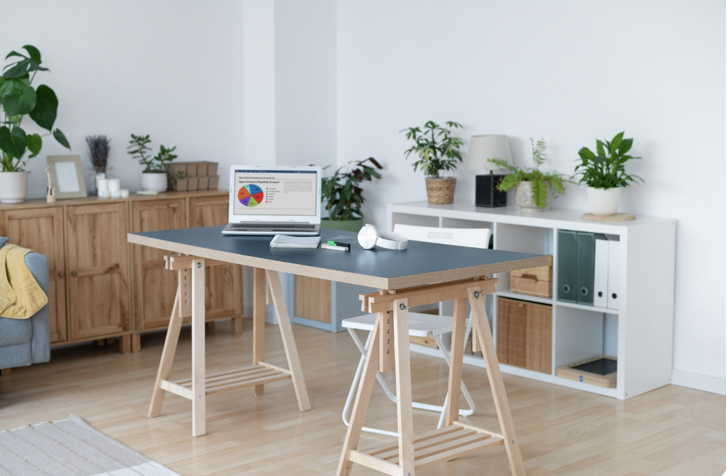When Work Comes Home: What to Know Before Upsizing for Your New Home-Based Business
There’s something thrilling about clearing out the guest bedroom to make space for a dream you’ve been putting off for years. Maybe it’s the pottery studio you’ve always wanted, or the boutique digital agency that’s finally taking off. Either way, working from home isn’t just a pandemic stopgap anymore—it’s a full-on lifestyle pivot. But when your business starts creeping into every corner of your current space—filing cabinets in the dining room, packing tape stuck to your coffee table—it might be time to admit it: you need more house.
Function Before Square Footage
Upsizing doesn’t mean you need a mansion in the suburbs. It means you need functionally more space. Before you start scrolling through real estate listings, take a hard look at what your business actually requires. Do you need a dedicated client meeting room with a separate entrance, or just better soundproofing for your podcast setup? Layout matters more than raw numbers here. A cleverly zoned home with 1,800 square feet can beat a poorly designed 2,500-square-foot house every time.
Zoning Laws Are Not a Vibe Check
You might fall in love with a charming Craftsman on a tree-lined street, but your city’s zoning laws could shut your whole operation down before you unpack your router. Some neighborhoods don’t allow home-based businesses that create traffic, signage, or certain types of foot traffic. And if you’re thinking of turning a garage into a commercial kitchen or running a daycare from your den, you’ll definitely need permits. Don’t skip this step. It’s not just red tape it’s the foundation for staying in business without the constant threat of legal headaches.
Hiding Storage Like a Boss
It’s wild how quickly inventory takes over a house. You start with a shelf of products in a closet and suddenly you’re kicking aside boxes just to make coffee. Whether you’re storing ingredients, shipping materials, or sensitive client files, your new space needs to accommodate it without turning into a glorified warehouse. Walk through prospective homes with an eye for hidden storage potential—think basement nooks, attic spaces, built-in cabinetry. And remember, clutter kills focus. An organized business starts with a house that’s built to handle the load.
Paperwork Before Paint Colors
If you’re crossing state lines to upsize, registering your business in your new state should be at the top of your moving to-do list—right up there with forwarding your mail and finding a new coffee spot. Different states have different rules, and waiting too long to register could lead to penalties or delays in your operations. Forming an LLC can help separate your personal assets from your business finances, which is especially useful when you’re juggling a mortgage and an growing venture. You don’t need to shell out for a high-priced attorney either—filing on your own or using a streamlined formation service like ZenBusiness can keep things easy and affordable.
Separation Is Everything
One of the most underrated aspects of running a business from home is knowing where work ends and life begins. If your laptop lives on the kitchen table, your business owns you. Upsizing gives you the chance to build in boundaries: a door you can close, a routine you can protect. Look for properties where your office or studio has a clear buffer from living space. A converted sunroom, an above-garage apartment, even a finished shed in the backyard can become a sanctuary for focused work-and protect your sanity in the process.
Don’t Forget the Tax Angle
Here’s something your real estate agent won’t always bring up: when your home is also your workplace, the IRS starts to pay attention. A portion of your new mortgage interest, property taxes, utilities, and repairs may become write-offs—but only if the business use is legitimate and exclusive. That spare bedroom turned editing suite? Good. The kitchen table where your kids also do homework? Not so much. Talk to a tax pro before you move, and make sure your new layout sets you up to take full advantage of the benefits without getting flagged down the line.
Investing in Future-Proofing
Right now, you might just need a cozy nook to take client calls and a place to stash packaging supplies. But what happens if your business doubles in size next year? Or you hire help? Upsizing is a chance to anticipate growth and bake in flexibility. Think about multi-purpose rooms that could evolve with your needs, or ADUs (accessory dwelling units) that can become offices, rental units, or both. The best spaces won’t just solve today’s problems—they’ll leave you options for tomorrow’s expansion.
Lifestyle Still Matters
It’s easy to get tunnel vision when you’re shopping for a house that fits your business. But don’t forget why you wanted to work from home in the first place. Was it to be closer to your kids? Avoid the commute? Carve out more time for gardening, or slow mornings, or just sanity? The home you choose should support all of that too. Don’t sacrifice walkability, natural light, or proximity to the places that feed your soul just because the basement has “office potential.” You’re building a life here, not just a company.
Upsizing to accommodate your business can be empowering, but it’s not just a logistical move—it’s a values move. You’re choosing to let your work and home life intertwine in a new way, and that deserves thoughtfulness. Make sure the space you’re moving into doesn’t just house your business, but honors the reasons you started that business in the first place. Because when work comes home, the stakes get personal—and so should the space you choose to grow in.
Discover the vibrant lifestyle and stunning landscapes of Sahuarita, AZ by visiting Green Valley Sahuarita today!


